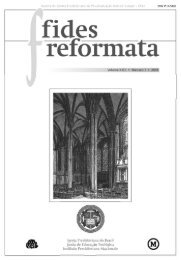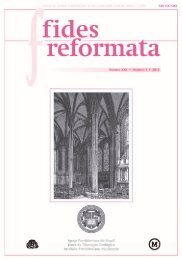Fides 22 N2
Um publicação do Centro Presbiteriano de Pós-graduação Andrew Jumper.
Um publicação do Centro Presbiteriano de Pós-graduação Andrew Jumper.
Create successful ePaper yourself
Turn your PDF publications into a flip-book with our unique Google optimized e-Paper software.
FIDES REFORMATA XXII, Nº 2 (2017): 139-162<br />
2.1 Kenneth Latourette, the contemporary broadcaster –<br />
the main arguments<br />
Warneck never ministered outside Germany, although his influence went<br />
beyond his geographical borders. Latourette, on the other hand, had a very limited<br />
cross-cultural experience, spending less than two years (July 1910-March<br />
1, 1912) in China, teaching American History through the Yale-China program.<br />
He returned to the United States on March 1, 1912 due to ill health and the<br />
oncoming Chinese revolution. 51 Latourette’s identifiable causes can be traced<br />
back to Warneck’s main arguments. Let us consider such arguments in light<br />
of the reformers’ perspectives, logical reasoning, and historical evidence. Latourette<br />
summarizes his arguments under six main subheadings. 52<br />
First, due to “the initial stages of the movement [theology, controversies,<br />
organization] its members had little leisure for concern for non-Christians outside<br />
of Western Europe.” Latourette’s apparent caustic remark – “little leisure” – implies<br />
that “missions” (the preaching of the gospel beyond the borders of Western<br />
Europe) was not in the reformers’ radar. Second, “several of the early leaders<br />
disavowed any obligation to carry the Christian message to non-Christians.”<br />
Who were those “early leaders” to whom Latourette refers? What did they<br />
really say and write that explicitly “disavowed any obligation” to reach out to<br />
the non-Christian world? What does Latourette mean by “non-Christians” and<br />
what historical data (evidence) does he use to support his claim that the early<br />
leaders of the Reformation “disavowed any obligation?” These are questions<br />
that Warneck tries to answer, but on which Latourette is simply silent.<br />
Third, “preoccupation with the wars which arose out of the separation of<br />
the Protestants from the Roman Catholic Church,” and who were so preoccupied<br />
with those wars that they dismissed any initiatives to preach the gospel<br />
beyond Western Europe. Was Western Europe really Christian? What kind of<br />
people groups were present in that part of the world at that time? Fourth, “the<br />
comparative indifference of Protestant governments to spreading the Christian<br />
message among non-Christians.” The argument here favors the Roman Catholic<br />
governments and assumes that Catholic monarchs were “mission-minded”<br />
Christian leaders. Were the Roman Catholic governments really concerned with<br />
spreading the true gospel of the Lord Jesus Christ among the non-Christians?<br />
Fifth, “Protestants lacked the monks who for more than a thousand<br />
years had been the chief agents for propagating the faith.” This seems to be a<br />
51 Latourette was commissioned at the annual meeting of Yale-in-China at the “Yale Commencement”<br />
in 1910. He calls those years in China, “The Missionary Years” in his autobiographical work<br />
Beyond the Ranges: An Autobiography (Grand Rapids: Eerdmans, 1967), pages 37-46. He hoped to<br />
return to China “In March, I left for the United States, hoping that a long summer in my old home in<br />
Oregon would bring complete restoration. So confident was I of resuming my work in Changsha that I<br />
purchased a round-trip ticket on a Yangtze steamer” (page 45). He was never able to return to Changsha.<br />
52 Ibid., 25-27.<br />
151




